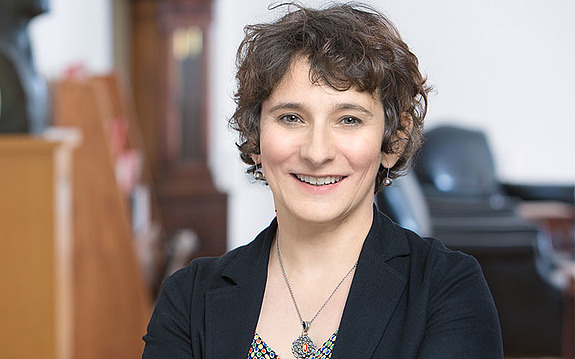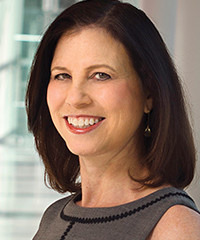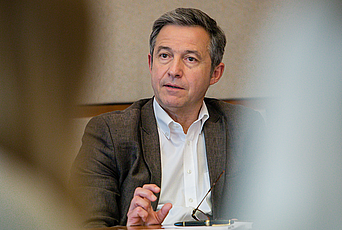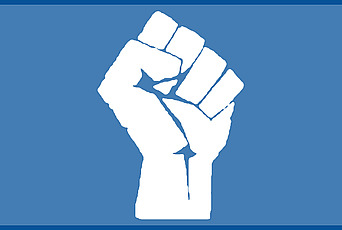A Digital Underclass? Marion Fourcade on Social Stratification in the Age of Covid

Marion Fourcade is Visiting Professor in the School of Social Science at the Institute for Advanced Study. A professor at the University of California, Berkeley, she is studying new forms of social stratification created by digital data collection. She spoke with Joanne Lipman, IAS’s Distinguished Journalism Fellow, about Covid-19’s impact on the transition to a digital economy, the threat to democracy, and increasing inequality. This interview was conducted on May 20, 2020. It has been edited for length and clarity.
Joanne Lipman: You recently wrote in Wired magazine that we have paid dangerously little attention to coronavirus’s challenge to democracy. What is the danger?
Marion Fourcade: It’s very simple. Democracy is something that we practice collectively, in groups. Coronavirus poses a very fundamental challenge to this basic postulate of political life. It makes it hard for the institutions of government to function, because those who work for them cannot meet easily. It also makes it difficult to vote in person. In theory, the pandemic also makes it difficult for people to express themselves by exercising their right to protest. The irony, of course, is that the pandemic is now coinciding with the most important street movement the United States has seen in decades.
And then there is the more fundamental fact that managing a public health challenge of this magnitude is associated with an enormous deployment of state power in every possible direction: sanitary, economic, police. The use of emergency powers can be very harmful to democracy. We’ve seen already that a number of governments have moved toward autocracy or muzzling free speech under the fog of the coronavirus crisis.
JL: How concerned are you about the harm to democracy in the United States?
MF: All of the things that I’ve mentioned are happening here. There has been a very strong partisan divide over remote voting in Congress, for instance. The Trump administration has been terribly ineffective in managing the pandemic, and yet its power has been magnified. Congress has so far approved roughly $3 trillion in relief funds, with more to come. This was necessary. But spending in these amounts is a big responsibility, and the administration has made accountability more, not less, difficult.
I am also concerned about the fact that the pandemic crisis, which is now also the worst economic crisis since the Great Depression, has made it easier for this government to accelerate the suspension of a number of basic rights, notably related to migrants and asylum seekers. There was recently an article in the New York Times about 900 migrant children being deported in March and April.
JL: You’re studying how data collection can be used to create new social classifications. What do you mean by that?
MF: I’ve been especially interested in systems that produce new ways of categorizing people and things and new ways of ordering and hierarchizing between them. Social media is one of these systems. It creates new kinds of associations, and new forms of stratification: the “influencers” and the rest, the people who are visible in your feed and those who are not.
But if you think about it, most digital systems work in this way: the purpose of data collection is to group you with people who are similar on some relevant dimension, and to create some sort of hierarchy within that group. For instance, every time you use your credit card, every time you pay a bill or take out a loan, data is being collected in digital form. Once aggregated and organized, this data serves to produce a version of your general financial profile—your credit report. It can even be used to produce a single number—a credit score.
Well, today, credit reports and credit scores are absolutely essential to what sociologists call life chances. That is, they not only determine whether or not you can get the next loan, but also whether you can rent an apartment, whether you can obtain cheap insurance, whether a potential employer will trust you, etc. This one thing that is happening in one corner of your life is having a huge impact in many other domains.
JL: Are you suggesting that new social classes will be created? Or conversely, that existing classifications will be reinforced?
MF: This is an excellent question. The way that I and my co-authors have been thinking about it in our recent work is really as new forms of social classification.
What you are seeing in the credit system is that being a subprime borrower puts you in a very different class of people; and that, in turn, percolates into many aspects of your life. Now it’s obviously related to traditional forms of stratification, like income and wealth. But it does not completely overlap with them.
And if you think of social media, for instance, what really matters is the ratio of the people you follow to the people who follow you.
From this point of view, the most powerful person on Twitter may be Jeff Bezos, who has millions of followers, but follows only one person, his ex-wife. That’s a new indicator of power, right? But he is also the wealthiest man in the world, and that’s probably still more significant!
JL: Does this phenomenon lead to greater or lesser social and economic mobility?
MF: That we don’t know yet. What we know is that many of these systems actually end up re-embedding very traditional forms of inequality, partly because whatever data is collected about people is itself shaped by social forces, like patterns of gender difference or institutional racism.
For instance, policing algorithms have been shown to be hugely problematic because they rely on data that is itself a product of discriminatory practices in the police and in the courts. But we also have the simple fact that people behave differently across social groups and categories. If women are less likely to get degrees in computer science and take jobs in this field, an algorithm that uses past data will be unlikely to present women with an employment opportunity in tech, thus reinforcing the existing gender bias.
JL: How might these new social stratifications be used?
MF: One possibility is that we will evolve towards a system that integrates scores from many different domains—the financial domain, maybe the physical/health domain, maybe school, work productivity, and so on. A little bit like the various “social credit” scoring systems currently being developed in China.
In the U.S. these tools have remained siloed so far. You have your credit score. Your phone most likely calculates some sort of fitness score, whether you want it or not, something insurance companies might be interested in. Individualized scores based on driving behavior (using sensor data) are becoming more common in the domain of car insurance. You can find out your Uber or Lyft rating. In case of high demand, the rating might regulate the time you wait for a car or the kind of driver you are being matched to. It could also presumably regulate the price of your ride.
Another possibility is a major push back against these kinds of systems. This has started to happen, particularly in the domains of criminal justice and employment. There are also demands to make all kinds of government decision-making algorithms (for instance for various kinds of benefits eligibility) more transparent.
JL: Has the pandemic opened your eyes to any other potential implications of the digital transformation of society?
MF: Yes. First of all, it’s made the questions of the economic power of large digital platforms even more important than before.
Amazon suddenly supplies the nation. Facebook decides to fully integrate across platforms (with Instagram and WhatsApp), and launches a video app that is similar to Zoom. We should worry about digital titans becoming even more titanic and presenting themselves as all-around problem solvers at a time when governments are so vulnerable.
I always anticipated that there would be a transition to this kind of online society. But it happened in two months. Not even. One month, right? I had not anticipated the hastiness of it, the urgency. I could never have imagined that.
And we’re right now creating patterns that are going to have huge, huge implications for the future. We have just jumped on certain kinds of systems because we needed something. And if we know anything about technological change, it is that there’s a lot of path dependency. Once you choose a system, you’re likely to get stuck. There’s a high chance that it’s going to reproduce itself.
I’m interested in this very fundamental reorganization of the economy and of the world of work in particular that is taking place as a result of what we may call the Great Online Migration.
JL: I love that phrase, the “Great Online Migration.” Is that a permanent phenomenon, or temporary during the pandemic?
MF: I think it’s there to stay. Many tech companies have already said they will allow their employees to work permanently from home. For those people, this may be a privilege, at least for a time.
That means cities will have to invest in internet infrastructure. It means the reorganization of domestic spaces, for those who can afford it. The pandemic has not only caused a very, very profound human catastrophe, but it may be accelerating a fundamental transformation in modes of existence. In lifestyles.
And it potentially gives us a sense of what profound new social divisions we may see emerging in the future. We don’t know yet how cities and governments are going to manage the new inequalities that are emerging out of this reorganization of the division between online and offline activities.
JL: So we could create an underclass of in-real-life workers.
MF: That’s one possibility. Another possibility is that there are a lot of sectors that are now primed for massive transformation, and that certain currently offline workforces will become more precarious as a result of this online migration. Education is obviously one example, all the more since many school districts and states are fiscally starved, and many higher education institutions are struggling financially. But maybe tech workers will be just as vulnerable. This was already a trend, and the pandemic has just accelerated the transition.
Ultimately, how the online/offline divide intersects with the rich/poor divide is unclear however. In higher education, we already have a divide between wealthier students, who are physically present on campus versus poorer ones, who are taking online courses.
JL: Aren’t there also potential positive outcomes? We’ve both attended Zoom funerals, for example, and found them very moving.
MF: Absolutely. There are lots of positive aspects. It’s allowed you to attend a funeral that you would not have attended otherwise, or to socialize in new ways. You could also presumably view the working of governments in a way that you couldn’t before.
JL: Another potential silver lining is that we’ve proven that remote working can be effective, and so employers have no excuse to penalize working moms or people with physical disabilities.
MF: Yes, I think that’s right. There are a lot of ways in which you can massively expand the pool of people you’re reaching either as employees, as students, through these technologies. You can educate more people, and it can be cheaper for each person, for instance.
But one possibility is that this is going to increase a race to the bottom, where it’s not only women who are going to be incorporated that way. But it’s poor women in developing countries who can be paid less than anybody else.
It’s not impossible that in the race to cut costs, this becomes the most practical step. Capitalism was never a moral enterprise. Because now the globe can be more integrated than it was before. So yes, on the one hand it’s quite wonderful that you can incorporate people from the other side of the earth who would never have a shot at these kinds of jobs otherwise. But you’re doing it precisely because you can pay them so much less.
JL: So in that case it could increase inequality.
MF: Because it further globalizes the competition between workers, it could increase inequality at home for sure. And possibly globally.





